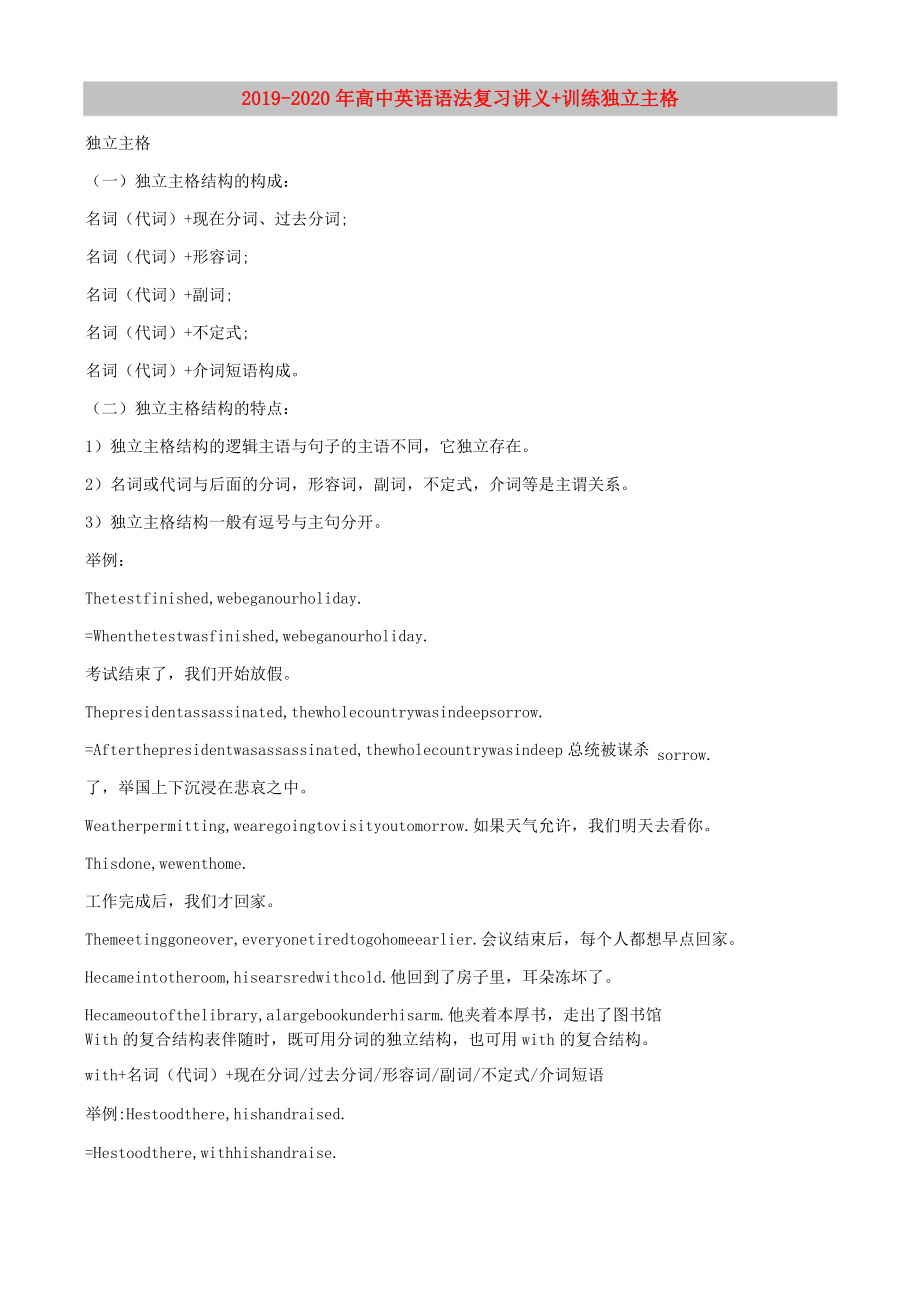《2019-2020年高中英語 語法復(fù)習(xí)講義+訓(xùn)練 獨(dú)立主格》由會(huì)員分享,可在線閱讀����,更多相關(guān)《2019-2020年高中英語 語法復(fù)習(xí)講義+訓(xùn)練 獨(dú)立主格(5頁珍藏版)》請(qǐng)?jiān)谘b配圖網(wǎng)上搜索��。
1�����、2019-2020年高中英語語法復(fù)習(xí)講義+訓(xùn)練獨(dú)立主格
獨(dú)立主格
(一)獨(dú)立主格結(jié)構(gòu)的構(gòu)成:
名詞(代詞)+現(xiàn)在分詞�����、過去分詞;
名詞(代詞)+形容詞;
名詞(代詞)+副詞;
名詞(代詞)+不定式;
名詞(代詞)+介詞短語構(gòu)成。
(二)獨(dú)立主格結(jié)構(gòu)的特點(diǎn):
1)獨(dú)立主格結(jié)構(gòu)的邏輯主語與句子的主語不同�,它獨(dú)立存在。
2)名詞或代詞與后面的分詞�����,形容詞����,副詞,不定式�����,介詞等是主謂關(guān)系。
3)獨(dú)立主格結(jié)構(gòu)一般有逗號(hào)與主句分開�。
舉例:
Thetestfinished,webeganourholiday.
=Whenthetestwasfinished,webeganour
2、holiday.
考試結(jié)束了�����,我們開始放假�。
Thepresidentassassinated,thewholecountrywasindeepsorrow.
sorrow.
=Afterthepresidentwasassassinated,thewholecountrywasindeep總統(tǒng)被謀殺了,舉國上下沉浸在悲哀之中���。
Weatherpermitting,wearegoingtovisityoutomorrow.如果天氣允許����,我們明天去看你�����。
Thisdone,wewenthome.
工作完成后�����,我們才回家�。
Themeetinggoneover,everyoneti
3、redtogohomeearlier.會(huì)議結(jié)束后,每個(gè)人都想早點(diǎn)回家���。
Hecameintotheroom,hisearsredwithcold.他回到了房子里��,耳朵凍壞了���。
Hecameoutofthelibrary,alargebookunderhisarm.他夾著本厚書,走出了圖書館
With的復(fù)合結(jié)構(gòu)表伴隨時(shí)��,既可用分詞的獨(dú)立結(jié)構(gòu)����,也可用with的復(fù)合結(jié)構(gòu)。
with+名詞(代詞)+現(xiàn)在分詞/過去分詞/形容詞/副詞/不定式/介詞短語
舉例:Hestoodthere,hishandraised.
=Hestoodthere,withhishandraise.
典型例題
T
4��、hemurderwasbroughtin,withhishands___behindhisback���。
A.beingtiedB.havingtiedC.tobetiedD.tied
答案D.with+名詞(代詞)+分詞+介詞短語結(jié)構(gòu)。當(dāng)分詞表示伴隨狀況時(shí)��,其主語常常用with來引導(dǎo)�。由于本句中名詞〃手〃與分詞〃綁〃是被動(dòng)關(guān)系,因此用過去分詞��,選D.
1)獨(dú)立主格結(jié)構(gòu)使用介詞的問題:
當(dāng)介詞是in時(shí)�����,其前后的兩個(gè)名詞均不加任何成分(如物主代詞或冠詞),也不用復(fù)數(shù)��。但with的復(fù)合結(jié)構(gòu)不受此限制
Arobberburstintotheroom,knifeinhand.
(hand前不能
5��、加his)����。
2)當(dāng)表人體部位的詞做邏輯主語時(shí),及物動(dòng)詞用現(xiàn)在分詞�,不及物動(dòng)詞用過去分詞。
Helaythere,histeethset,hishandclenched,hiseyeslookingstraightup.
典型例題:
Weather___,we'llgooutforawalk.
ApermittedBpermittingCpermitsDforpermitting
答案B.本題中沒有連詞��,它不是復(fù)合句�,也不是并列句。句中使用了逗號(hào)����,且we小寫,可知其不是兩個(gè)簡單句��。能夠這樣使用的只有獨(dú)立主格或with的復(fù)合結(jié)構(gòu)���。據(jù)此判斷��,本句中使用的是獨(dú)立結(jié)構(gòu)��,其結(jié)構(gòu)為:名詞+分詞
6����、。由于permit在這里翻譯為'天氣允許'��,表主動(dòng)�����,應(yīng)用現(xiàn)在分詞�,故選B。
如果不會(huì)判斷獨(dú)立結(jié)構(gòu)作狀語的形式�����,不妨將句子改為條件句�����,例如本句改為fweatherpermits,we'llgooutforawalk.然后將if去掉�,再將謂語動(dòng)詞改為非謂語動(dòng)詞即可
2019-2020年高中英語課堂15分鐘達(dá)標(biāo)練Module1Lifeinthe
FuturePeriod3Grammar外研版必修4
I. 用所給詞的適當(dāng)形式填空
1. FromtomorrowtoJune17,he(travel)alongtheYangtze
River.
2. Canyouimaginewhatkin
7、dofcarwe(drive)in2020?
3. We(climb)YueluMountainatteno'clocktomorrowmorning.
4. I(take)anexamat2:30tomorrowafternoon,soIcan't
goskatingwithyou.
5. Ihopehe(find)agoodjoboneday.
6. Thatbus(leave)in10minutes.
7. Ithinkthekids(do)theirhomeworkwhenwegethome.
8. They(watch)footballmatchat7o'clockto
8�����、morrowevening.
答案:1.willbetravelling2.willbedriving3.willbeclimbing4.willbetaking
5.willfind6.isleaving7.willbedoing8.willbewatching
II?完成句子
1. 下午五點(diǎn)至六點(diǎn)之間不要給我打電話,那時(shí)我們?cè)诔燥垺?
Don'tphonemebetween5:00p.m.and6:00p.m.We
dinnerthen.
2. 克雷格教授明晚作關(guān)于伊特魯里亞陶器的演講����。
ProfessorCraigalectureonEtruscanpottery
tom
9、orrowevening.
3. 我今晚將在辦公室里待到很晚���。
Ilateintheofficethisevening.
4. 明天這個(gè)時(shí)候你會(huì)在做什么呢?
Whatyouthistimetomorrow?
5. 今天下午我沒空,我要為一個(gè)朋友送行��。
Iwon'tbefreethisafternoon.Iafriendoff.
6. 下個(gè)月我會(huì)去看你�。
Iyounextmonth.
答案:1.willbehaving2.willbegiving3.willbestaying4.will;bedoing5.willbeseeing6.willbevisiting皿語法填空
閱
10���、讀下面材料,在空白處填入適當(dāng)?shù)膬?nèi)容(1個(gè)單詞)或括號(hào)內(nèi)單詞的正確形式����。
Manyyearsago,NormanCousinswasdiagnosedas“1(dead)ill".
Hewasgivensixmonths2(live).Hischanceforrecoverywas1in500.
Hecouldseetheworry,depressionandangerinhislifecontributed3_,andperhapshelpedcause,hisdisease.Hewondered,“Ifillnesscan4_(cause)bynegativity(消極情緒)�����,canw
11����、ellnessbecreatedbypositivity?”
Hedecidedtomake5experimentofhimself.Laughterwasoneofthemostpositive6(activity)heknew.Herentedallthefunnymovieshecouldfind—Keaton��,Chaplin��,F(xiàn)ields��,theMarxBrothers.Hereadfunnystories.Heaskedhisfriendstocallhim7theysaid,heardordidsomethingfunny.
Hispainwassogreatthathecou
12��、ldnotsleep.8_(laugh)for10solidminutes,hefound,relievedthepainforseveralhourssohecouldsleep.
Hefullyrecoveredfromhisillnessandlived920happy,healthy
andproductiveyears.Heowedhisrecoverytoimagination,theloveofhisfamilyandfriends,andlaughter.Heoncesaid:“I10(live)thesamehappylifein50years.”答案:1.deadly2
13�、.tolive3.to4.becaused5.an6.activities
7. whenever/when8.Laughing9.another10.willbeliving
B
DebbieHartisgoingtoswimacrosstheEnglishChanneltomorrow.She
1_(go)tosetoutfromtheFrenchcoastatfiveo'clockinthemorning.
Debbieisonlyeleven2(year)oldandshehopestosetup3newworldrecord.Sheisastrongswimmerandma
14��、nypeoplefeelthatsheissuretosucceed.Debbie'sfather4(set)outwithherinasmallboat.MrHart5_(train)hisdaughterforyears.Tomorrowhe6(watch)heranxiouslyassheswimsthelongdistancetoEngland.Debbieintendstotakeshortrestseverytwohours.Shewillhavesomethingtodrink7shewillnoteatanysolidfood.MostofDebbie'sschoolfriends8(wait)forherontheEnglishcoast.AmongthemwillbeDebbie'smother,who9(swim)theChannelherselfwhenshewasagirl.ManypeoplebelieveDebbiewill10(real)createawonder.
答案:1.isgoing2.years3.a4.willset5.hastrained6.willbewatching
7.but8.willbewaiting9.swam10.really
 2019-2020年高中英語 語法復(fù)習(xí)講義+訓(xùn)練 獨(dú)立主格
2019-2020年高中英語 語法復(fù)習(xí)講義+訓(xùn)練 獨(dú)立主格

